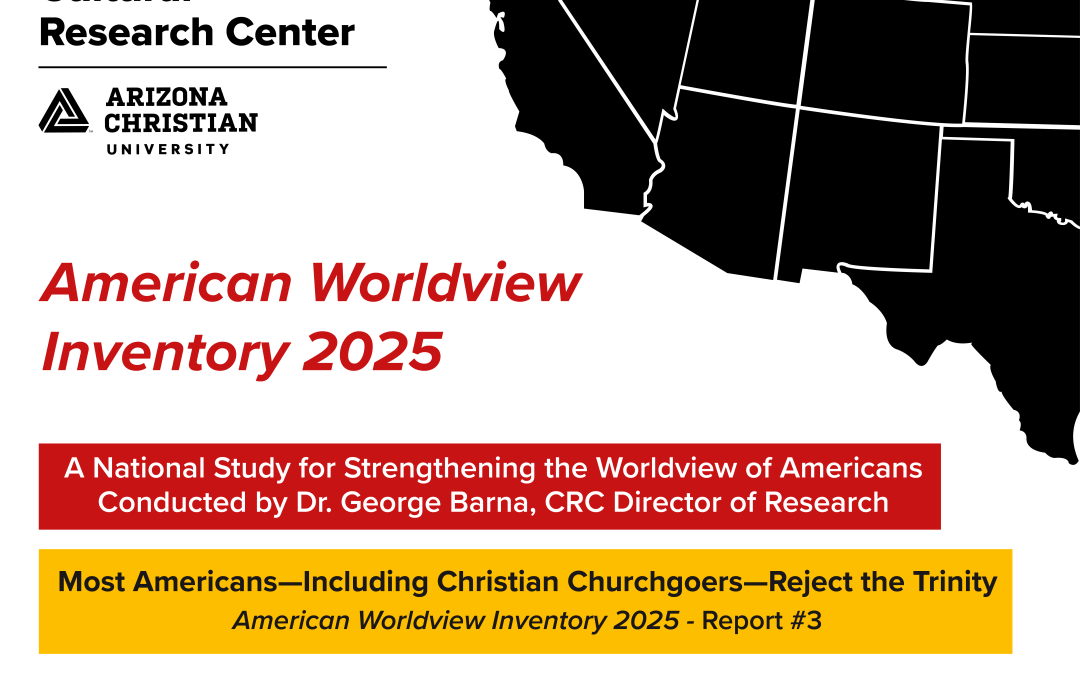CRC Staff | March 27, 2025 |
From the Cultural Research Center at Arizona Christian University
Glendale, AZ —A striking new study from the Cultural Research Center at Arizona Christian University reveals a sharp divide between Americans’ self-reported Christian identity and their belief in a core doctrine: the trinity, where the God of the Bible exists as one inseparable deity in three persons—God the Father, Jesus Christ, and the Holy Spirit.
Though two out of three Americans call themselves Christian, only 11% of all adults—and 16% of self-proclaimed Christians—affirm this foundational tenet.
This new data, part of the American Worldview Inventory 2025 from veteran researcher Dr. George Barna, highlights a growing disconnect between Christian identity and theological understanding. While the trinity has been a cornerstone of Christian doctrine for centuries, the latest findings show that even among churchgoers, this foundational truth is largely misunderstood or rejected.
The report reveals that:
- Only 40% of adults believe the God of the Bible exists and is active in their lives.
- Just 59% believe in the existence and influence of Jesus Christ.
- Only 29% believe in the presence and power of the Holy Spirit.
When combined, these statistics show that very few Americans hold a trinitarian view of God. Even among the most devout population segment—those with a biblical worldview—just 62% affirm the doctrine of the trinity.
Barna, CRC’s Director of Research and creator of the study, expressed concern about its implications. “These findings about America’s ignorance or rejection of the trinity are simply another in a long list of examples of people living without the truths and life principles of God shaping their life,” he said.
The data suggests a cultural drift not only away from biblical beliefs but from any clear understanding of who God is. Two earlier reports from the American Worldview Inventory 2025 show Americans are redefining God in their own image and are minimizing the role of God in their lives.
“It could be argued that the primary theologians influencing the spiritual views of America these days are figures such as Tucker Carlson, Joe Rogan, Russell Brand, Jordan Peterson, Megyn Kelly, and Bill Maher,” Barna explained. “They mix practical and sometimes unbiblical theology and philosophical points of view into their commentary on life and world events.”
As Barna points out, most Christian denominations—including “almost all Protestant, Catholic and Eastern Orthodox communities of faith”—uphold the trinity as a “mainstream doctrinal foundation,” while groups like Mormons, Jehovah’s Witnesses, Christian Science, and Scientology reject it.
Introduced by second-century theologian Tertullian and solidified through centuries of Christian teaching, the concept describes God as “three distinct but inseparable and equal persons in one infinite Being.” In it, the Father is the creator, Jesus Christ the redeemer, and the Holy Spirit the sustainer—unique in function, yet united in essence and purpose.
Despite this historical affirmation, the research suggests this “mystery of the faith” remains abstract or irrelevant to many Americans, even those identifying as Christian.
As Barna explains, these latest findings have significant implications for individuals, the church, and for the faith of the country. The research paints a picture of a nation filled with people who may claim the name of Christ, but lack the doctrinal depth to live in alignment with a biblical worldview, he said.
“These results are further evidence of the limited or lack of trust Americans have in the Bible, the limitations we place on the authority and influence of God, and our refusal to cooperate with God by living in harmony with His ways and purposes,” Barna explained.
The report underscores a theological crisis in a country where Christianity remains the dominant faith by self-identification. With only 16% of self-professed Christians affirming the trinity, the gap between identity and belief signals a challenge for churches to refocus on teaching the essentials of biblical faith.
As Barna notes, the findings highlight the growing need for the Church to rekindle its commitment to helping people truly know God and understand His nature.
The American Worldview Inventory 2025: A National Study for Strengthening the Worldview of Americans is the sixth annual study conducted by the Cultural Research Center (CRC) at Arizona Christian University under the leadership of Dr. George Barna. It is specifically designed to examine concerning trends in American beliefs about God, truth, sin, and salvation. Through it, CRC is seeking to understand why these key aspects of American faith are weak and to provide practical insights for rebuilding a strong biblical worldview in our nation.
Read the full report, “Most Americans—Including Most Christian Churchgoers—Reject the Trinity” from the American Worldview 2025 here. For free access to future releases, subscribe at www.CulturalResearchCenter.com.
2

